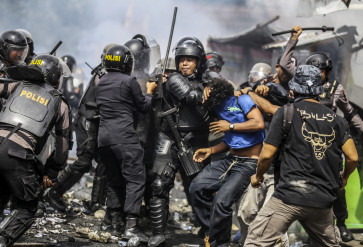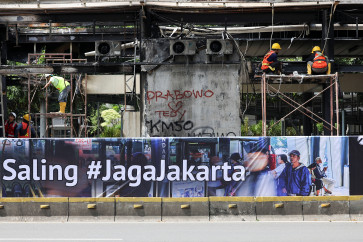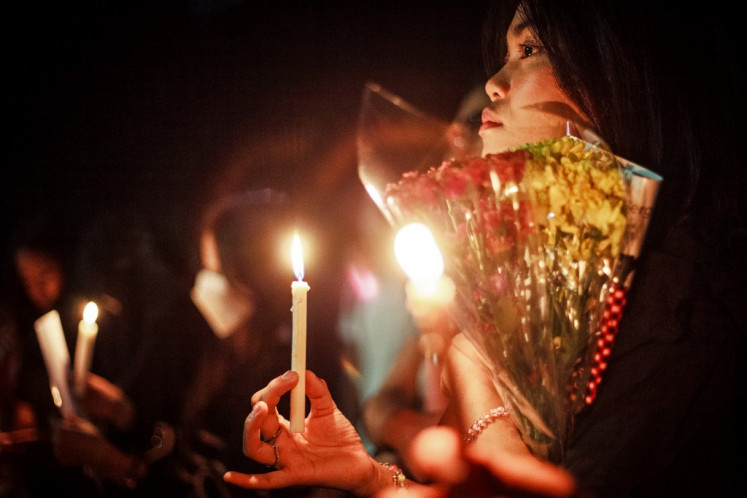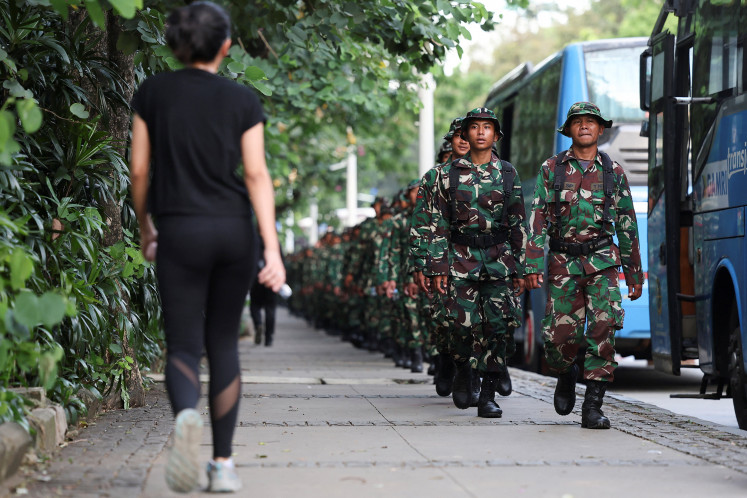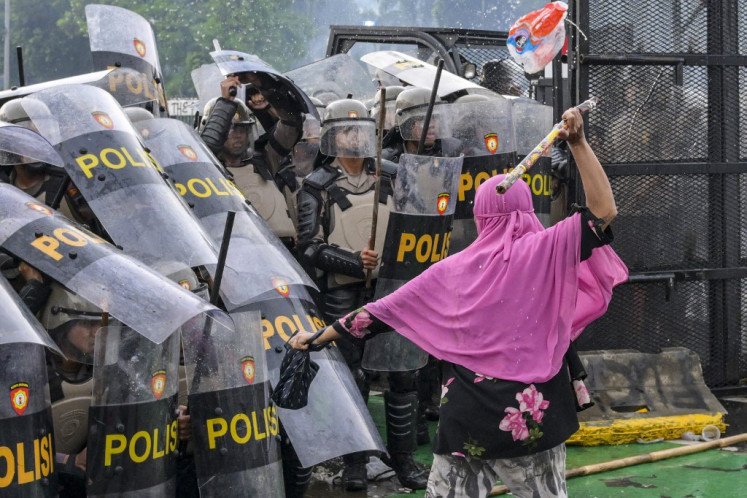Popular Reads
Top Results
Can't find what you're looking for?
View all search resultsPopular Reads
Top Results
Can't find what you're looking for?
View all search resultsJuwono Sudarsono: Growing older, much wiser
JP/P
Change text size
Gift Premium Articles
to Anyone
JP/P.J. Leo
Early in March, former defense minister Juwono Sudarsono told me US President Barack Obama would most likely cancel his planned trip to Indonesia later in the month.
Why? Because of pressing domestic problems, especially the Republicans’ growing rejection of his healthcare bill, he said.
I looked him in the eye, and just said, “Really?”
“Yes, if he can’t push the healthcare bill through the Congress before the day he has to leave for Jakarta then we must anticipate the possibility that he will not come. I think he will delay it until June,”
he said.
Given the euphoria Obama’s planned visit inspired among the people of Indonesia and its government, it is perfectly understandable that many friends, including a number of experienced journalists and observers, laughed when I conveyed Juwono’s prediction on the possibility of Obama’s trip being delayed.
“He’s too old already,” said one senior journalist.
The journalist, like most Indonesians, was too keen to celebrate the coming of the world’s most influential person to see that the US president has to settle his own domestic problems first before taking care of any foreign business.
Soon after, the White House announced Obama was delaying his trip from March 20 to March 23 before publicizing he would postpone it to June, precisely as Juwono had predicted.
When I met him last week, he did not come up with a “I told you so” statement, probably because he is too modest to have remembered ever making a prediction on Obama’s trip. Instead, the professor, who just celebrated his 68th birthday last month, handed me a book on US foreign policy’s new focus on how global poverty could endanger its security.
And then we talked – or more precisely, I interviewed him – about poverty and Indonesia’s security for the next two hours or so.
For as far as my generation remembers he has been a respected expert, with a dollop of wisdom to give away since the 1980s or even back to the 1970s. Now, he is much wiser.
He still listened and never monopolized the conversation.
Incredible as it may seem for a person with such a high caliber and reputation, Juwono has not changed, and has remained modest when talking to any people from any walk of life, with his students – well, almost all now-famous political commentators regard him as their teacher – and journalists adoring him.
Born March 5, 1942 in Bandjar Ciamis, West Java, Juwono was educated at the University of Indonesia (UI), then at The Institute of Social Studies, The Hague, Netherlands and The University of California at Berkeley before obtaining a PhD from The London School of Economics and Political Science (LSE).
Son of the late Dr Sudarsono, who was minister of home affairs and minister for social affairs in the late 1940s, Juwono served as UI’s head of the department of International Relations and dean at the School of Social and Political Sciences, from 1985 to 1994. He also taught at the School of Public and International Affairs, Columbia University, New York City, from 1986 to 1987.
Juwono Sudarsono married Rr. Priharumastinah in November 1973, and has two sons, Vishnu Juwono (born in 1974) and Yudhistira Juwono (born in 1978). The family also includes three dogs, Milo, Balto
and Max.
As a public servant, Juwono did a three-year stint as vice governor at the National Defense Institute (Lemhannas) from 1995 to 1998, before Soeharto appointed him as state minister for the environment in 1998.
After Soeharto’s fall, he became the minister for education and culture under then president B.J. Habibie before accepting the defense minister post under then president Abdurrahman Wahid from 1999 to 2000 – thus becoming the country’s first civilian defense minister in four decades.
In 2003, he was sent as an ambassador to the United Kingdom, where he stayed for a year before President Susilo Bambang Yudhoyono handpicked him as his defense minister for his 2004-2009 Cabinet.
“So, I served as a minister under four presidents… I was able to closely watch the dynamic of Sukarno’s style of governance as I acted as a liaison between the students and the president during the students’ demonstration in 1965-1966. I am now back to teaching and doing research,” Juwono said.
However, during his tenure as defense minister, Juwono enraged human rights activists when he stated the 1989 Talangsari massacre in Lampung conducted by the military personnel was justified, challenging the National Human Rights Commission (Komnas Ham), which found evidence of systematic and widespread killings, torture, demolition and the displacement of villagers.
A number of observers, however, noted that Juwono was merely being consistent when he defended the military – which he had helped reform with the transfer of military businesses to the state – against what he considered ‘unfair’ attacks on the armed forces.
“The President asked me to take care of the TNI [armed forces]. With such an insufficient budget, I had to make sure the military could perform its basic defense duties while soldiers could fulfill their needs with their salary. But you can’t save all people, you must choose,” he said.
Juwono praised Yudhoyono as “a kind and trustworthy man” when I asked about his opinion on his former boss.
“But he should have been tougher against political parties. Our government is a presidential system not a parliamentarian one, so his position is strong as guaranteed by article 4 of the Constitution. The coalition should not be on the party level. It’s a presidential coalition where the President has the highest power,” he said.
“Have you told him to be tough?” I asked.
“Yes, I told him as early as 2006. You see, I met him personally only three times while I was a minister. Otherwise, we would meet during Cabinet sessions or surrounded by other ministers. But every time, I told him to be tough,” he said.
Juwono said the Century case and the following House of Representatives’ investigation should have warned the President to be strong. “I left office before the century case emerged. In my last note to the President, I advised him to reaffirm his power as a president in the presidential system.”
He added that the President’s speech on March 4 defending his ministers and vice president in the Century case was long-overdue, which cemented the image of a strong President vis a vis the House of Representatives.
It turns out the speech was able to contain the impact of the Century case on his administration.
This time, the former minister should have said, “I told you so”.


